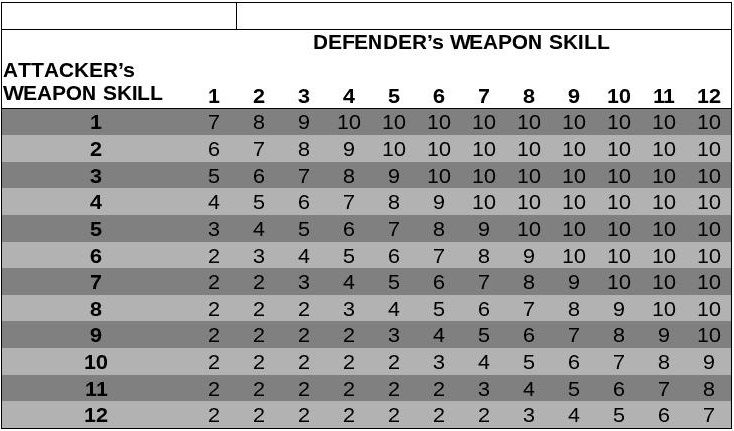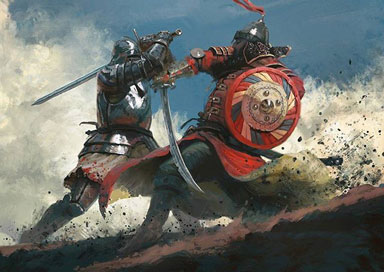Imagine this story as the story of VHS and Betamax.
The first took over the second for marketing reasons.
Advanced Heroquest was a D12 based game, while D&D 3.0 was a D20 based game.
However, the core difference between these two systems is not about dices.
It is a conceptual difference.
Oh! Let’s make it clear! Even if Advanced Heroquest was published by Games Workshop it’s mechanics had nothing to share with Warhammer Fantasy Rpg.
You know, the kind of dices you employ to “design” the game mechanics doesn’t make a new innovative game.
Not at all!
Dices only determine the statistical distribution of random events occurring in your game, provided the Game Master wants to roll such events of course.
For example, you can tweak the mechanics of D&d and have it works with D100, or 3d6.
If you employ a D100 you have a statistical distribution very similar to a D20 system, while if you employ 3d6 you have a different distribution.
In the end, what matters is how you employ the outcome of your dice roll.
Now, let’s go back to the topic, because we have to understand the important difference between Advanced Heroquest (D12) and D&D (D20) combat system.
Ready to be mind-blown?
Follow me and be patient then, I’ll try to be clear and employ short sentences.
D&D Combat System
D&D combat system you is composed of two main steps.
First: You roll a D20 to hit a target.
Second: You compare the roll with the target Armor Class (AC).
Well, you roll and add eventual bonus, and you compare the roll with the Armor Class plus eventual bonus.
The Attack Roll is 1D20 + something.
The Armor is 10 + something.
Wait? Why 10 and not 11, or 9? Or why not 15!
Well, some of you already know the answer, for those of you readers that ignore the answer it’s time to know it.
10 is indeed the average of a D20, rounded down.
note: provided each of a D20 has an equal chance to be rolled, if you sum each number of a D20 sided dice – 1+2+3+…++18+19+20 – and you divide the sum by 20, you obtain 10.5 (210/20=10.5), rounded down is 10.
Wait Angry Golem! Are you telling me that I could roll a D20 every time my character receives an attack, and this could basically work?
Yes, my dear reader. You are entitled to do so, it is statistically plausible, but it would unpractical…to many dices to roll.
Also, D&D combat system doesn’t take into account the character level and experience when it’s time to avoid or dodge an attack.
Imagine two fighters, both without armor and dexterity bonus.
Both have armor class 10.
One fighter is level 1, the other is level 20.
Now, for the the level 1 fighter, hitting a level 20 fighter is easy as hitting Jimmy the farmer.
Of course Jimmy the farmer will probably die under the blow, while the level 20 fighter won’t.
More hit point, nothing else.
This is how D&D combat system works.
It is not a skirmish, it is a royal rumble.
Ok. We have clarified this concept.
As I told you, be patient, because I’m going to lead you to the point.
Follow me.
Advanced Heroquest Combat System
Advanced Heroquest combat system obeys to a completely different principle.
When you attack a target, the target’s ability to wield weapons (weapon skill or WS) matters!
Indeed, your weapon skill is all you have got to avoid a blow.
And your weapon skill is all you have got to determine your chance of hitting a target.
Now, it doesn’t matter if the combat system employs a D12.
What matters is that the combat system compares the combatants skill with weapons.
Example
If you are a dwarf with weapon skill 10 (pretty high), and you are fighting against an elf with weapon skill 12 (very high), then you are going to have a really bad day. It doesn’t matter your level, that elf trained more than you with weapons, and he will probably employ your guts as his new scabbard.
On the other side, if you are fighting against an Ogre with weapon skill 6 (quite low), then you’ll probably slice the dumb and awkward monster piece by piece. It will take time of course, but in the end your dwarf will kill the ogre.
In such kind of combat system you just need to determine how a different score in your weapon skill interacts with the weapon skill of your opponent.
How do they influence each other?
If I have weapon skill 10, what is the chance of hitting a target with weapon skill 6, 7, or 8?
Do I want to employ a table? Do I want to create a rule to calculate it?
Will the chance to hit be linear, exponential or logarithmic?
The solution Advanced Heroquest provided was explained on table.

Let’s read it together.
Now, imagine an attacker with WS 7 (weapon skill), and a defender with WS 7 also.
Two opponents with the same skill with weapons.
The attacker, in order to hit the defender, has to roll a 7 or more on a D12. A bit above the average of a D12.
However, if the attacker faces a defender with WS 5, then the attacker has to roll 5 or more on a D12.
The attacker has more chance to hit a defender who is less skilled with weapons.
Now, as you can clearly see, the armor your character is wearing doesn’t count or influence the chance to hit a target.
In Advanced Heroquest your armor impose a sort of “damage reduction” to the damage dealt.
In other words, the tougher your armor is, the less damage you receive.
Skirmish combat style!
Hack & Slash vs Skirmish
So, this is what the comparison between Advanced Heroquest and D&D is about.
Two different combat system.
Each one with its pro and cons.
An Hack & Slash combat system implies that you employ armor as a static value the is opposed to the attack roll, but the character experience and level doesn’t influence the chance to dodge a blow.
A Skirmish combat system implies that you compare both opponents weapon skill, and you employ armor to reduce the damage received.
Both are interesting.
Converting D&D combat system into a Skirmish combat system
Theoretically it is possible.
You could try the experiment.
However you should have to recalibrate the role of armor, revise the damage dealt by weapons, testing the amount of hit points, and other stuff.
Not impossible for sure, but not very practical at the same time.
The better solution is to design new game mechanics.
I would employ a D20 in place of a D12, because the D20 is a better compromise in term of statistical distribution.
Conclusions
I hope the topic treated in this article has stimulated your curiosity.
The forgotten and underestimated Advanced Heroquest has something to teach us.
It is even possible that Angry Golem Games is going to design an interesting game mechanic that employs the best from Hack & Slash and Skirmish combat systems.
Who knows…
…however this is another story.
